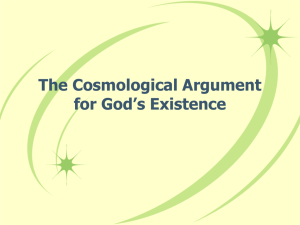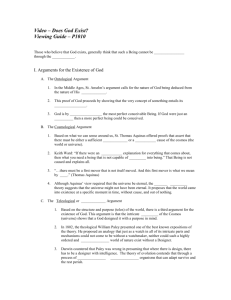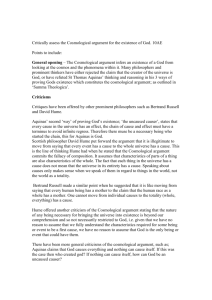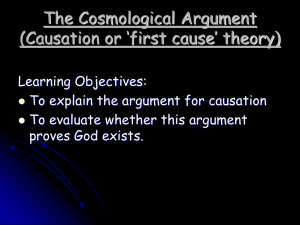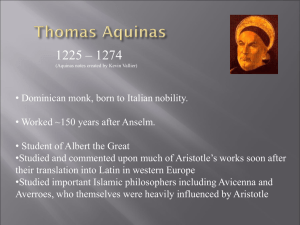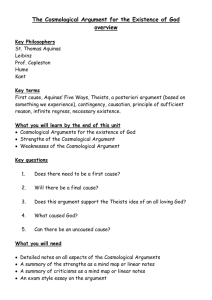The Cosmological Argument
advertisement
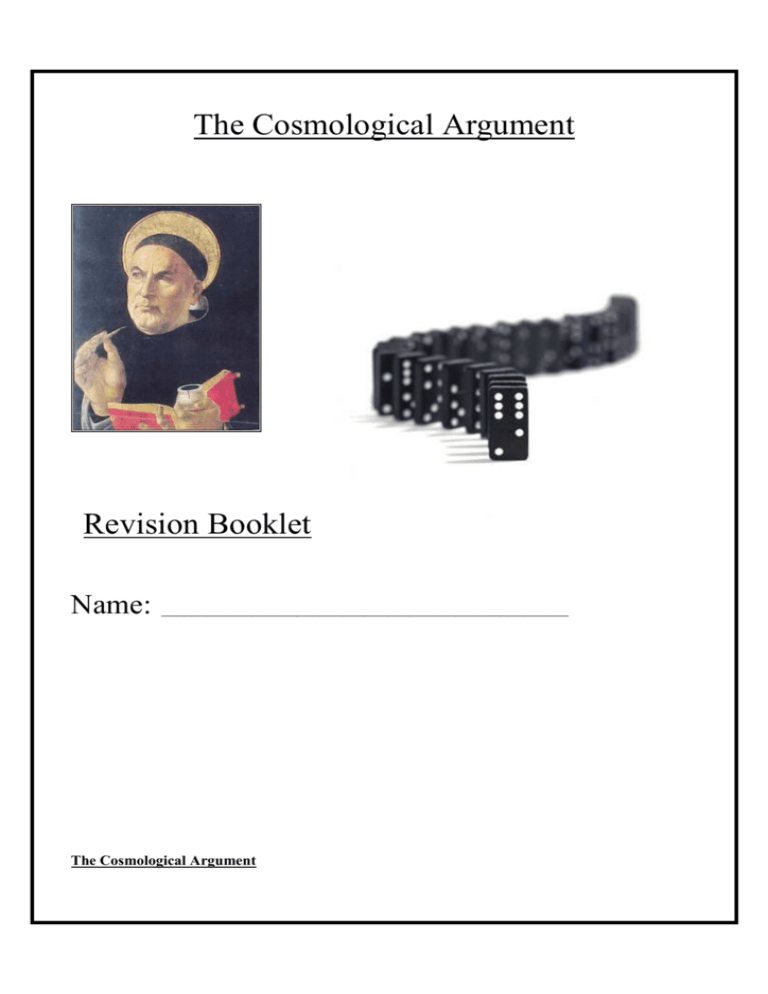
The Cosmological Argument Revision Booklet Name: ______________________________________________________ The Cosmological Argument • • • • • • The argument is based on the claim that everything existing in the universe exists because it was caused by something else; that ‘something’ was itself also caused by something else. However, it is necessary for something to have started this all off – something which did not and was not itself caused/created. That ‘something’ is God. The Cosmological Argument is a posteriori, it draws on evidence and experiences we have all had. It is also inductive, because it has premises which lead to a likely conclusion. It is sometimes called the First Cause Argument because it suggests that the world must have had a first cause. Philosophical characteristics of God: Aristotle: • • • • • • God is an eternal being as is the universe God is perfect or actuality with no potentiality This means God is perfection and has no potential to reach God is the cause of movement in the universe – this movement is through desire to be like God. Everything moves in the universe through this desire. God is not a first (efficient) cause; instead he is a final cause. Aquinas (Atemporal God): • • • • • • Roman Catholic Priest who believed God to be a first (efficient) cause God is separate to the universe He created. God is timeless which means he is outside of time and space (atemporal). God is not affected by the bounds of the universe (i.e. growing older, changing or dying). Instead God is unique, perfect and pure actuality. God is therefore the uncaused cause / unmoved mover / necessary being. Thomas Aquinas’ Cosmological Argument • • • The most well-known version of the Cosmological Argument was put forward by St Thomas Aquinas in his book, Summa Theologica. In this book, Aquinas puts forward five ways to the existence of God. The first three of his ways make up the popular version of the Cosmological Argument. • • Aquinas avoids the word ‘proofs’. He realises that it is impossible to prove that God exists, but seeks to provide the reader with a way to belief in the existence of God. Basis of the argument in observation • • • • • • The basis of the cosmological argument is the perception that the universe exists. We perceive this through all our senses, and our senses suggest that there is a real world causing our experiences. For example, I see the orange before me, I feel the texture of it, I smell it, so all my senses seem to come together in suggesting that there is real orange before me. The same is true of our experience of the universe, and so it seems right to conclude that the universe or cosmos really exists. The second stage of the cosmological argument claims that if we accept the first stage of the argument (the cosmos exists) - as we have - we must assume a second claim, that there is a reason or cause of the cosmos' existence. This claim is supported by the observation that all the things we experience have a cause so it seems rational to look for the cause of the universe itself. The rejection of infinite regress • • • • The cosmological argument rejects the possibility of infinite regress. As the argument is concerned with cause and effect it states that the universe has a first or efficient cause. Thomas Aquinas held that among the things whose existence needs explanation are contingent beings that depend for their existence upon other beings. We cannot keep following a causal chain back and back; our experience tells us that this causal chain must have had a starting point. 1. The First Way – Motion / Change • • • • Aquinas argued that every change that happens in the world is caused by something else, which is turn is caused by something else. He believed that this chain cannot go on forever. Like Aristotle, whose work Aquinas greatly admired, he believed that the reason why things move or change is because they are being moved or changed by something else. Unlike Aristotle however, Aquinas rejected the idea of infinite regression. • • • Therefore, Aquinas believed that there must be a first mover who causes movement (or change) in other things and who begins a chain of movement whereas Aristotle believed change was a result of a final cause i.e. things moving toward God. As this first mover must be different to the things he moves, he himself cannot be moved by anything else. For Aquinas, this first mover is God. Example: In other words ... Potential Wood is potentially hot. Actual Fire is actually hot Change Fire makes the potentially hot wood actually hot. 2. The Second Way – Causation • • • • • • • The Second way is based on the nature of an efficient cause. We find that there is a sequence of efficient (first) causes in the observable world. We have no experience of anything that is the cause of itself. This would suggest the thing would have existed prior to itself, which is impossible. However, the chain of causes cannot be infinite as every sequence of causes has a first, intermediate and final cause. If you take away one of the causes then you take away the effect. If there were no first cause, there would be no ultimate cause, and no intermediate causes. • • • This is false because we have experience of cause and effect. We are therefore bound to suppose that there is a first efficient cause. This first cause is God. Example: First efficient cause Intermediate cause Ultimate cause 3. The Third Cause – Contingency and Necessity • • • • • • • • The final cosmological argument or third way is from the nature of contingency and necessity. Everything in the world has contingent existence, which means that it could easily not have existed at all. There was a time in the past when I did not exist and there will be a time in the future when I will not exist. Aquinas states that everything which exists is caused to exist by something else. Again, this chain cannot go on forever, so if we trace the chain of contingently existing beings back, we will eventually arrive at a being with necessary existence. This is a being which is not dependent upon anything to exist or to be. This necessary being Aquinas believes is God. A necessary being is required as if the cause of the universe exists contingently then we would have an infinite chain of causation which Aquinas rejects; therefore the ultimate cause of the universe must exist differently to the universe and be necessary. Example Everything within the world that exists is contingent. Examples of contingent beings are humans, plants and animals. In order for the world to have come into existence we need a non-contingent being as if it is contingent we have the questions ‘what is its cause?’ Therefore, we look outside the world for the creator, a necessary being which is God Other Versions of the Argument and how they differ from Aquinas Gottfried Leibniz – Principle of Sufficient Reason • • • • • • Leibniz supported the Cosmological Argument because he believed that there has to be a “sufficient reason” for the universe to exist. He felt that the universe must have a cause. Leibniz believed that the idea that the universe has always existed (has infinite existence) is not a satisfactory explanation for its existence. He felt that God is the first uncaused cause on which everything else depends. Leibniz makes the point that a backwardly infinite series of states of universe, each explained by an earlier state without any cause acting from outside, would leave the existence of the universe as totally unexplained. For Leibniz and other Philosophers such as Richard Swinburne an infinite regress is not a sufficient reason whereas God is sufficient. The Kalam Cosmological Argument • Everything that has a beginning of its existence has a cause of its existence. • • • • The universe has a beginning of its existence. Therefore the universe has a cause of its existence. If the universe has a cause of its existence then that cause is God. Therefore God exists. • The first premise (part) of the argument is the claim that everything that begins to exist has a cause of its existence. In order to infer from this that the universe has a cause of its existence supporters of the kalam cosmological argument must prove that the past is finite, that the universe began to exist at a certain point in time. The crucial premise of the Kalam cosmological argument, then, is the second part: “The universe has a beginning of its existence”. Advocates of the Kalam cosmological argument claim that it is impossible that the universe has an infinite past. In support of this claim, modern supporters of the argument often appeal to modern science, specifically to the Big Bang theory. Modern science, they say, has established that the universe began with the Big Bang. The cosmological argument is the argument that the existence of the world or universe is strong evidence for the existence of a God who created it. The existence of the universe, the argument claims, stands in need of explanation, and the only adequate explanation of its existence is that it was created by God. • • • • • • • • Copleston’s version of the Cosmological argument • • • • • • • • Copleston’s version of the Cosmological argument is similar in reasoning to that of Aquinas’ 3rd Way. Copleston begins by pointing out the obvious truth that many things in the universe are contingent: that is, they are dependent on something else for their own existence. Copleston then claims that the universe as a whole can be seen as a collection of contingent objects. None of the objects within the universe contain within themselves the reason for their own existence – they are all dependent on other things. Since all things within the universe are contingent objects, the ultimate explanation for their existence must be external to the universe. The explanation is God. God is a being which is external to the universe. God is necessary which means he does not depend on anything for his own existence Different understandings of the role of God in the Cosmological argument God as a temporal first cause • • • • • • This is associated with the Kalam version of the argument Temporal means in time Therefore if God is a temporal first cause he exists in time A straightforward way to understand God in the Cosmological Argument (in this instance) is to see him as being at the beginning of the universe and starting everything off. We see the universe as a series of events with God positioned right at the very beginning. The difference between this argument and Aquinas is that God for Aquinas is distinct from the universe. God as the sustainer of motion (First Way) • • • • • • Like Aristotle, Aquinas suggests God’s first role is as the prime mover. Unlike Aristotle, God is an unmoved mover in the sense that he is an efficient (first) cause of movement For Aquinas everything that is moved is moved by something external to it, there must be a chain of movement. This chain cannot be infinite or there would be no movement in the first place. There is movement and change therefore there must be an unmoved mover causing all movement without being moved this is God. If God did not continually sustain movement then all movement would stop. God as the sustainer of cause (Second Way) • • • • • • • The second role identified by Aquinas is that of an uncaused cause. As he rejects infinity the argument follows that there must be a first cause that does not have a cause of its own. The kind of cause that Aquinas had in mind can be illustrated by the relation between the electricity supply to keep the image on TV screen. The electricity supply keeps the image on the screen in the sense that the supply has to be there continuously here and now to keep the image there. If the supply is cut off the image will go. This kind of cause is called cause in esse. This is the sense in which Aquinas argues that God is the first cause: he is needed as a constant presence to keep all causal chains working. God as the sustainer of existence / reason why there is something rather than nothing (Third Way) • • • • • • • Aquinas’ third way, the argument from contingency identifies that God is the sustainer of existence as well as being the reason why there is something rather than nothing. The basic argument outlines that God is a necessary being that exists separate from the universe. Therefore, God does not require an explanation for his existence. God is an uncaused cause of the universe and thus responsible for our existence. As human beings are contingent creatures then they must look beyond themselves and beyond other contingent beings for the reason why they exist as they do. The universe therefore is wholly dependant on God and the causal chain can be followed back to God. Thus God caused and sustains our existence and as God is a necessary being is the reason why there is something rather than nothing. God as creator • • • • • • The cosmological argument also infers (suggests) that God is the creator of the universe. There are two ways in which God can be viewed as creator from the argument 1) Creation ‘ex nihilo’ – out of nothing and 2) Creation ‘ex deo’ – out of the substance of God. ‘Ex Nihilo’ expresses the important idea that God did not operate on pre-existing matter Instead, God is the absolute origin of all that exists, all matter, all energy, and all organisation come from God. ‘Ex deo’ expresses the view that everything that exists owes its existence not only to the creative action of God, but also to the very substance of God. God created the world from himself rather than from nothing or from some external pre-existing matter. Challenges to the Cosmological Argument • Not all Philosophers agree with Aquinas that the universe was caused and sustained by God or even that there is evidence that the universe has a beginning. David Hume • • • • • • • • He believed that all knowledge and ideas, however complex, can be reduced to some experience that our senses provided. Hume’s examination of people’s mode of thinking led him to conclude that humans think they know a great deal more about the external world than is warranted. Hume argued that the mistake humans make is to allow imagination to make a connection between cause and effect. For Hume, therefore, Aquinas is wrong in making a connection between cause and effect. Aquinas has observed cause and effect around him and the existence of the universe. His error, Hume is arguing, is to join those two events together when they are in fact two separate events. It is just the habit of the mind that has made the connection between the two events; it is induction. Hume implies two possibilities: 1. That the universe could simply be ‘brute fact’. That is we do not require a first cause. 2. A beginning does not automatically mean God was responsible. • • Hume argued that the fundamental premise of the Cosmological Argument that every event must have a cause could be neither be proved not established. Hume argued that as we have no direct experience of the creation of the universe we could not speak meaningfully about it. Immanuel Kant • • The German philosopher Immanuel Kant agreed with Hume’s reasoning. He examined the argument of the existence of a Supreme Being as a first cause of the universe. • • • • • • • He argued that the idea that every event must have a first cause only applied to the world of sense experience. It cannot apply to something we have not experienced. He therefore believed that the conclusions of the cosmological argument go far beyond the evidence. Hume and Kant have already identified that due to our inability to observe the cause of the universe we are lacking any empirical evidence for God as the first cause. This is further emphasised by Hume as he criticises the argument further. Hume states ‘even if the Cosmological Argument was valid, it would still not establish what its supporters claim. If there had to be some first cause, why could this not be the material, physical world rather than God? Russell’s Criticisms of the Cosmological Arguments • • In 1947 there was a famous BBC radio debate between the Christian Philosopher Frederick Copleston and the famous atheist Bertrand Russell. Russell refused to accept two key underlying assumptions of the Cosmological argument: 1. The assumption that the universe is contingent or dependent on something outside the universe for its existence • • • Russell refused to use the terms `contingent` and `dependence` with reference to the universe. He famously argued: “I should say that the universe is just there, and that is all.” What he meant by this was that he accepted the existence of the universe as just a brute fact – he felt no need to ask why it is there or what caused it to be there. • Russell says that Copleston and Aquinas commit a fallacy of composition because they apply what is true for an individual being to the whole of the said being. He uses the analogy that every human has a mother, but this does not mean that the human race as a whole has a mother. Peter Vardy adds to this and says that 'one cannot move from individual causes to a claim that the totality of all has a cause'. • • 2. The assumption that there must be a complete explanation for the existence of the universe. • • • • • Russell rejected the idea that there has to be a complete explanation for the universe. Russell did not feel the need to enquire any further than the brute, material existence of the universe. He believed that things in the universe `just are`: everything does not require an explanation. Russell supports the possibility of infinite regress. His arguments count against not only Copleston but also Aquinas. • He does not agree that the universe must have had a beginning; instead he argues that there may be no reason for the existence of the universe. • If Russell was pushed by being told that “everything requires an explanation” he could turn the tables on the Cosmological argument and say “if everything requires an explanation, what is the explanation for God?” The possibility of infinite regress • • • • One of the major objections to the argument is the suggestion that infinity is impossible and that the universe had a beginning. Many philosophers point out that Aquinas and Copleston contradict themselves when they reject the possibility of the infinite. Aquinas and Copleston denied the infinite and yet argue that God is infinite. Aquinas and Copleston can then be accused of making a logical contradiction in their argument. The identity of the necessary being as God • If the Cosmological Argument does lead us to accept that there is a first mover, first cause and necessary being, does it follow that this being is the God of classical theism? • The argument is a posteriori because it asks us to use our experiences of motion, cause and effect and contingent existence to get to God. If we use our experience of the world of death, suffering and evil, should we assume that the necessary being Aquinas talks of is evil, unloving and uncaring? Might there be many necessary beings? Looking at the imperfections of this world, perhaps it was the first creation of a necessary being that unimpressed with his efforts, left the world and went onto bigger and better things. • • • Scientific challenges to Aquinas’ cosmological argument • Scientific theories about the origins of the universe have been used to to reject aspects of Aquinas’ cosmological argument for the existence of God. Anthony Kenny • • The British philosopher Anthony Kenny presents an argument that undermines Aquinas’ First Way related to motion and change. In The Five Ways (1965), Kenny said that Aquinas’ principle that nothing moves itself goes against the fact that people and animals move themselves. The Steady-State Theory • • • The steady-state theory counts against Aquinas’ Third Way related to contingency and necessary existence, by suggesting that the universe is eternal. This theory provides a scientific explanation that would undermine the cosmological argument as it denies a beginning to the universe. It is the opposite view to the cosmological arguments as it teaches there is no beginning or end to the universe, that the universe has always been there and that its appearance does not change with time. Big Bang Theory • • • This theory provides a scientific theory to explain the beginning of the universe. The Big Bang theory is a challenge to the cosmological argument only if it is accepted as a rival theory to the cosmological argument. If the Big Bang is considered to be a spontaneous random event without reason or cause then Aquinas’ assertion that God is mover and cause of the universe is undermined. Is the cosmological argument valuable for religious faith? Yes Aquinas intended the argument to point people towards a belief in God and to suggest that there is evidence for religious faith. It is possible that the Cosmological Argument could bring someone to belief in God or strengthen a religious person’s faith. If you added the cosmological arguments to Aquinas’ two other arguments for the existence of God then the reasons for believing in God are strengthened. Brian Davies supports this approach and states that, No Aquinas himself referred to his ideas as ‘ways’ not ‘proofs’ and so it seems unlikely that an atheist would begin to have religious faith after reading about the Cosmological Argument. We have also seen that the argument points to a necessary being and first mover / cause rather than the God of classical theism. Perhaps thinkers who support the argument can, at best, expect agnostics to lean towards the idea that there might be a ‘sufficient reason’ for the existence of the universe. although the Cosmological Argument can not prove the existence of God alone, it could establish the existence of God when taken together with other evidence, such as the Teleological Argument: “As an argument for a first cause of all existing things, the cosmological argument seems a reasonable one.” (Davies: An Introduction to the Philosophy of Religion) For religious believers the arguments for the existence of God and in this case the cosmological argument simply support their already existing belief in God. They cannot expect them to be led to the allpowerful, all-loving God of Christianity, as the sufficient reason could be an evil God, or many gods. Leaky Bucket Argument = Some philosophers argue that the different ‘proofs’ for the existence of God cannot have cumulative weight as several bad arguments together do not make a sound argument, just as several leaky buckets cannot hold water. Faith is the starting point of belief; if a person has faith they will accept the cosmological argument as fact. Strengths and Weaknesses of the Cosmological Argument Strengths Weaknesses Swinburne believes that the Cosmological Argument is a strong inductive argument as it leads to a conclusion that it is likely that the God of classical theism is the unmoved mover, uncaused causer and necessary creator of the universe. The fundamental premise of the argument contradicts itself. The suggestion by philosophers such as Aquinas, Copleston and Craig that infinity is impossible yet God is infinite is a logical contradiction. Therefore the conclusion that God exists is flawed. He states, using Ockham’s Razor, that the fact that the universe exists needs to be explained and that the simplest and therefore most likely explanation for the universe is God. "When you have two competing theories which make exactly the same predictions, the one that is simpler is the better." The argument is an ‘a posteriori’ argument which means it is based upon empirical evidence. The strength of this lies in the fact that the argument The argument does not offer any firm support for belief in the God of classical theism. It may be beneficial for those who already have faith in God but for the atheist the argument is weak. For Hume and Kant the cosmological argument fails to justify the existence of God – instead it only hints at the possibility of a potential first cause. Brian Davies takes the position that the cosmological argument alone cannot stand as a proof for the bases assumptions on the observable world rather than mere definition as some other arguments try to do. As everyone has experience of cause and effect then they are able to understand the belief in the universe having a first cause for themselves. The Big Bang theory has provided scientific support for the argument as it demonstrates that the universe has a beginning and therefore the universe is not infinite. Scientists who accept the Big Bang theory have not yet fully established what caused the Big Bang. No one can argue against the existence of the universe and their experience of it. Since the universe is the starting point of the argument it has an advantage. existence of God, and would have to be supported by other evidence. The design argument (Teleological) might be further evidence to establish the existence of God but that has also been heavily criticised. The cosmological argument arrives at conclusions based on assumption. According to Hume humans make the link between cause and effect in their experience of the universe in their lives to God causing the universe which is far removed from their lived experience. Furthermore, Bertrand Russell believed that the cosmological argument is weakened by the fallacy of composition by assuming that just because humans have mothers then the entire universe must have a mother. Furthermore, as we are able to measure time, this would suggest a beginning to the universe. If we were in an actual infinite universe we would not be able to measure time. Scientific theories such as Newton’s first law of motion, the steady-state theory and the Big Bang theory all challenge and severely weaken the cosmological argument. The cosmological argument satisfies the need to find a cause of the universe and the origins of everything within the universe. For the theist (believer in God) it offers support to their faith as well as providing meaning and purpose to their existence. Each of the theories highlights weaknesses in Aquinas’ ways and suggests that there is no need for God as the universe is either eternal or the result of a spontaneous random event. Essay Questions January 2009 1) Explain the different understandings of the role of God which are found in Aquinas’ cosmological argument. (30 marks A01) You should refer to God as the sustainer of motion, causation and existence, as a first cause, and as the explanation as to why there is something rather than nothing. This can be done with reference to each of Aquinas’ Three Ways. Expect reference to Aquinas’ cosmological argument including God as the unmoved mover (Prime Mover), the uncaused causer (The First Cause) and necessary being. You should be referring to the concepts of ‘cause in esse’, creation ‘ex nihilo’ and creation ‘ex deo’. 2) Assess the claim that the cosmological argument does not help religious faith. (15 marks A02) Arguments in agreement with the view: It only points to the idea that there is a first cause but it does not offer proof for the God of classical theism. The argument draws conclusions that go far beyond the evidence at hand (Kant & Hume). Copleston’s argument is disputed by Russell because of the fallacy of composition and brute fact argument. Arguments that disagree with the view: God being answer to first cause and God is the reason why there is something rather than nothing. It highlights God as a necessary being and the sustainer of cause, motion and existence. Discussion need not be limited to Aquinas’ forms of the cosmological argument. Accept wide diversity of meaning of term “religious faith” including discussion about the nature of “faith” compared to “reason / proof”. 19 June 2009 1) Explain Aquinas’ cosmological argument. (30 marks AO1) This question is concerned purely with an explanation of Aquinas’ cosmological arguments or first 3 ways. You should explain all three forms of Aquinas (first mover, first cause and necessary being). Your explanation may include identification of basis of argument in terms of observation and rejection of infinite series. You could also use examples to support each of the 3 ways, change (e.g. wood becomes hot); cause (causal chain of borrowing money or humans), contingency (God existing separately or outside of the universe in order to remain different or separate. 2) Assess how far Aquinas’ cosmological argument shows that it is reasonable to believe in God. (15 marks A02) Arguments in support of view Expect focus on strength of arguments, e.g. gives explanation of why there is something rather than nothing, basis in observation and on empirical evidence of cause and effect, rejection of infinite regression, contingency, scientific theories support (Big Bang). Arguments challenging the view The discussion will probably be in terms of criticisms. There should be some relating of the argument to the issue of reasonableness. The argument fails to show nature of ‘God’, it simply identifies a first cause but not the God of classical theism. The focus will be on reasonableness and there will be an appropriate evaluation in terms of ‘how far’. January 2010 1) Explain key criticisms of the cosmological argument. (30 marks A01) 20 This question is concerned with the challenges to the Cosmological Argument. You are NOT being asked to explain the argument but rather to explain the criticisms. Note that the question says criticisms. In order to achieve the maximum 30 marks you have to give at least two fully developed criticisms. What you could include: • • • • • Bertrand Russell and his ‘brute fact’ argument. Bertrand Russell and the fallacy of composition e.g. we have mothers so the universe has a mother. David Hume’s challenge based on induction and that the argument can neither be proved nor established. Scientific challenges Kant – conclusion beyond the evidence THE BEST WAY TO ANSWER THIS QUESTION WOULD BE TO EXPLAIN TWO OF THE CRITICISMS IN DETAIL RATHER THAN A BRIEF OVERVIEW OF ALL THE CRITICISMS. 2. ‘The weaknesses of the cosmological argument far outweigh its strengths.’ (15 marks A02) To what extent do you agree with this view? The focus of this question is to be able to identify both strengths and weaknesses of the argument. Always keep in mind that the question is asking to what extent do you agree; therefore you should back up your opinion with evidence. If, for example, you agree with the statement you could mention some of the strengths but highlight their limitations and the force of many criticisms. If you disagree you put forward the positive arguments but also reply to some of the criticisms. June 2010 1) Explain the cosmological argument with particular reference to: i) The rejection of infinite regress ii) God as the necessary being (30 marks A01) 21 Answers should focus on the actual areas listed in the question and how they relate to the cosmological argument rather than on a general presentation of the cosmological argument. E.g. explanation of ‘infinite regress’ and its significance to the argument; the need for a start to a series / need for explanation. Expect explanation of ‘necessary being’ and philosophical need for God to be necessary rather than contingent. You should put forward Aquinas’ Three Ways but only in relation to the two areas. Therefore, the concept of infinite regress is prominent in the First and Second Way and the concept of God as a necessary being is prominent in the Third Way. 2) Assess how far the cosmological argument proves that God exists. (15 marks A02) Arguments in support of the view: Cosmological argument is a strong inductive argument. God is the simplest reason and this suggests proof of existence. Big Bang theory – the universe has a beginning and requires a being capable of starting the universe i.e. God. It offers support for those who already believe in God. Arguments against the view: Aquinas offered Ways not proofs which suggest even Aquinas did not think it could prove God’s existence 100%. It might strengthen belief in God but it would not prove to an atheist that God exists. According to Hume and others is makes a leap from evidence to assumption that God exists – no proof. Hume also believes that we have no evidence of God as we have no evidence of the first cause. January 2011 1) Explain how Aquinas’ cosmological argument attempts to prove that God exists. (30 marks A01) This question is asking you to explain Aquinas’ Three Ways but to also focus on how it tries to prove God exists. For level 6-7 there needs to be an explanation as to why God is required. Unmoved mover (unchanged changer/prime mover). Aquinas focuses on the process by which an object acquires a new form. A potentiality to become something 22 different. Idea of first mover which must contain all actuality and no potentiality – God. Aquinas developed this idea from Aristotle and believed that God was a being that had fully reached its potential. Uncaused causer. Nothing can cause itself otherwise it would already have to exist in order to bring itself into existence. There must be a first cause – God. This idea is linked to the Third Way in that a necessary being must exist and God is a necessary being. You want to explain that Aquinas believes God to be a being that is separate from the causal chain. Contingent beings require a necessary being – God. 2) Assess the value of the cosmological argument for religious faith. (15 marks A02) Arguments that say it is of value: It offers intellectual support for belief in God (‘a posteriori’ – based on evidence of cause and effect). The argument reveals God as a first cause, sustainer of motion, causation and existence. It highlights that God is a necessary being. Arguments that say it is of limited or no value: The argument is flawed as it is inductive and not proof (Hume), it makes a logical contradiction (God is infinite / infinite regress impossible, it draws conclusions that go beyond the evidence (Kant). Arguments are not needed for religious faith.


